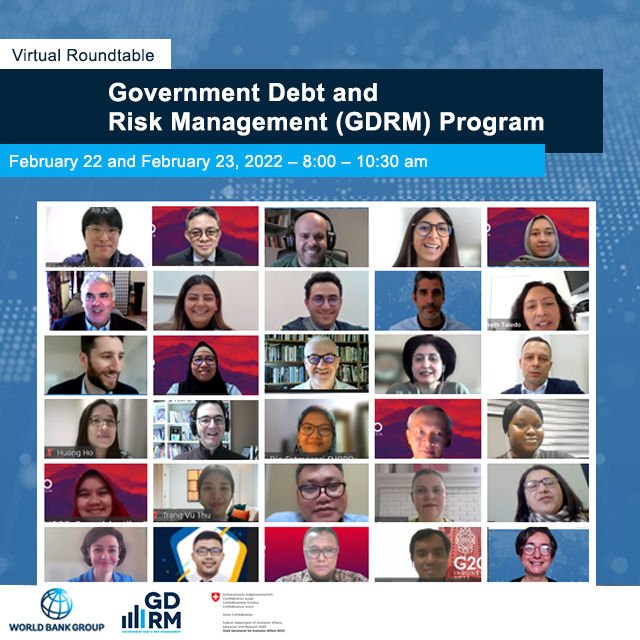Tuesday, February 22, 2022
Opening remarks
Speakers: Martin Saladin, Head of Operations, Economic Development and Cooperation Division, SECO and Ivailo Izvorski, Practice Manager, Macroeconomics, Trade & Investment, Global Macro and Debt, World Bank
Taking stock of the GDRM program
Presenter: Lars Jessen, World Bank
Session 1: Current challenges in debt management (60 min Roundtable)
Over the past two years we have witnessed unprecedented challenges for debt managers in terms of heightened uncertainty, higher funding needs and operational risks. The aim of this session is to have a discussion of the main challenges faced and how these challenges have been addressed. And we will discuss what to expect when things normalize.
Chair: Ivailo Izvorski, World Bank
Session 2: Management of fiscal risks
With the ongoing Covid-19 pandemic, the likelihood of fiscal risks materializing has increased as the macroeconomic shocks negatively impact a wide range of risks that tend to be highly correlated. Such risks have an adverse effect on countries’ funding needs during already challenging fiscal times. Debt management offices are usually associated with fiscal risks emanating from loan guarantees. Other risks that are closely related with debt arise from the debt of SOEs and sub-nationals as well as fiscal commitments and contingent liabilities from PPPs. In this session, we will discuss the roles and responsibilities of debt management office regarding debt-related fiscal risks and share country experiences.
Moderator: Cigdem Aslan, World Bank
Presenters: Serbia, Peru, Colombia
Wednesday, February 23, 2022
Session 3: The use of ESG instruments
Global investors have increasingly been integrating Environmental, Social, and Governance (ESG) considerations in their investment activities in the recent years, and the markets for thematic debt finance instruments, such as green bonds, have been growing rapidly. Facing the large financing needs to address the global climate change challenges, especially the financing gaps in developing countries, policy makers and stakeholders have expressed their expectations that creative deployment of these instruments would channel the vast capital market resources to fill the financing gaps.
From a debt management perspective however, is it more hype than substance? This session will discuss the experiences of debt managers weighing the options of issuing such instruments (cost perspective, reporting requirements, design of an ESG framework), how they navigated internal and external demand for these instruments, and their experience with issuing or deciding not to issue at this stage.
Moderator: Lea Hakim, World Bank
Presenters: Rodrigo Cabral, World Bank Treasury, Egypt, Indonesia
Session 4: The delivery of technical assistance under the GDRM program
The delivery of the GDRM program is based on long-term partnerships between the World Bank and program countries, and the support of implementation of reforms in targeted areas of public debt and risk management. Program delivery has used various channels, from missions, training events, peer-to-peer group dialogue, webinars, and off-site support, and, during the pandemic, virtual support. This session draws lessons on the “how” of the GDRM program. Questions to be addressed in this session include: Has adequate and useful expertise been delivered? How do you assess the virtual support provided? How can reform implementation be strengthened, specifically, how can senior management support be ensured? Has enough been done to ensure sharing of experiences and knowledge on common themes relevant across countries? Have webinars under the GDRM umbrella and for broader audiences added value?
Chair: Lars Jessen, World Bank
GDRM Outreach Activities
Presenter: Banu Turhan Kayaalp, World Bank
Closing remarks: Ivailo Izvorski, World Bank
